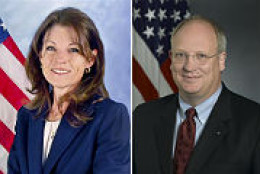PSC
-
It's day three of our special report "The Missing Pieces of Procurement Reform". Today's focus -- taking stock for the future. What aspects of the procurement process should the government preserve or replicate across government? Stan Soloway is president and CEO of the Professional Services Council, and Roger Waldron is president of the Coalition for Government. They joined In Depth with Francis Rose to explain what's working well in the procurement process.
October 16, 2014 -
The House and Senate Armed Services Committees are trying to pay close attention to defense acquisition reform. Dave Wennergren is senior vice president of technology policy at the Professional Services Council and the Pentagon's former chief information officer. Beth McGrath is director of Deloitte Federal Practice and the Defense Department's former deputy chief management officer. They joined on In Depth with Francis Rose to discuss acquisition reform.
June 30, 2014 -
In the coming months, the federal government will release a detailed plan for implementing more than a dozen recommendations to improve the security clearance process, said Office of Management and Budget Deputy Director for Management Beth Cobert. The government's recommendations, which were included in an interagency report published by OMB last month, call for "continuous evaluation" of clearance holders and strengthened oversight of the background-investigation process.
April 16, 2014 -
Tucked away inside the bipartisan budget deal announced with much fanfare this week is a proposal limiting the maximum level contractors can charge the government to pay the salaries of their top executives to nearly half of what it is currently. But it may not be the final word on the issue on the sticky issue of contractor compensation. the budget deal's proposed changes to taxpayer-funded contractor salaries are competing with another piece of bipartisan legislation currently before Congress. The annual Defense Authorization Act seeks to lower the compensation limit but by far less than the budget deal.
December 13, 2013 -
The Office of Federal Procurement Policy issued a memo to agencies setting the new benchmark for reimbursable costs at $952,308, up from $763,029 in 2011 for certain contractor employee salaries. The contractor cap has increased 55 percent over the last four years. OFPP blames Congress for not acting to change the formula for calculating the annual increases.
December 05, 2013 -
With the announcement from Defense Secretary Chuck Hagel recalling most Defense Department civilians from furloughs, some large defense companies, which had been planning to furlough their employees, have canceled or scaled back their initial plans. However, DoD's move could wind up having only a limited impact on contractors more broadly.
October 07, 2013 -
The General Services Administration plans to award the $60 billion multiple award contract for complex professional services by October. Concerns again arise over whether there are too many multiple award contracts.
July 12, 2013 -
In a letter to Tom Sharpe, the commissioner of the General Services Administration's Federal Acquisition Service, three industry groups -- the Coalition for Government Procurement, the Professional Services Council and TechAmerica -- wrote that restricting communication between managers and contractors could have a "chilling effect" on managers' role in the Multiple Award Schedules (MAS) program.
June 27, 2013 -
Reducing the contractor compensation cap to the level of the salary drawn by the President ($400,000) or the Vice President ($230,700), as suggested by some lawmakers and the White House in the past, would dramatically increase the number of employees who earn compensation above the allowable limits GAO said. But the changes would mostly affect large companies, auditors said, because few of the small companies it surveyed pay their employees more than the amount earned by the President and Vice President.
June 19, 2013 -
Rep. Darrell Issa plans to formally introduce the Federal IT Acquisition Reform Act before the end of March. The House Oversight and Government Reform Committee held its second hearing on the draft bill. Current and former federal officials say the bill should place a stronger emphasis on project management and workforce issues.
February 28, 2013 -
In an analysis prepared for the American Federation of Government Employees, contracting expert Charles Tiefer said that agency managers have a number of tools at their disposal to legally scale back service-contract spending and that doing so would be preferable to federal furloughs.
February 11, 2013 -
Guidance from the administration on what steps federal agencies should take to prepare for potential across-the-board budget cuts has set off a war of words between federal-employee unions and industry groups. The American Federation of Government Employees says guidance exempts contractors at the expense of federal employees, but industry groups say the criticism is misguided.
January 18, 2013 -
Stan Soloway, the President and CEO of the PSC, and Phil Kangas, a principal with Grant Thornton, joined Pentagon Solutions with Francis Rose to discuss the findings of a survey of federal acquisition personnel.
January 02, 2013 -
Congress has cleared the way for a $633 billion defense policy bill that includes mandated reductions to the Defense Department's civilian and contractor workforces. Leaders of a House-Senate conference committee, tasked with reconciling competing versions of the 2013 National Defense Authorization Act, included in the final report the automatic workforce reductions that opponents say would result in about 36,000 job losses.
December 19, 2012 -
Frank Kendall, the undersecretary of Defense for acquisition, technology and logistics, is promising a Better Buying Power 2.0, an revision to earlier reforms. That's good news to many in the defense industry, who hope the changes provide more nuanced guidance — as opposed to strict blanket policies — to agency contracting officers. Stan Soloway, president and CEO of the Professional Services Council, In Depth with Francis Rosethe time is ripe for an update.
October 05, 2012




